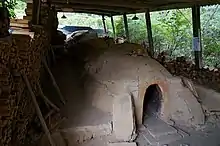List of Intangible Cultural Properties of Japan (Hyōgo)
This list is of the Intangible Cultural Properties of Japan in the Prefecture of Hyōgo.[1]
National Cultural Properties
As of 1 July 2015, four Important Intangible Cultural Properties have been designated, being of national significance.[2][3][4]
Performing Arts
| Property | Holder | Comments | Image | Ref. |
|---|---|---|---|---|
| Classic Rakugo 古典落語 koten rakugo | Nakagawa Kiyoshi (中川清) | |||
| Ningyō Jōruri Bunraku 人形浄瑠璃文楽 ningyō jōruri bunraku | Tsukamoto Kazuo (塚本和男), Hirao Katsuyoshi (平尾勝義) | inscribed on the UNESCO Representative List of the Intangible Cultural Heritage of Humanity[5] | ||
| Gidayū Bushi Shamisen 義太夫節三味線 gidayū bushi shamisen | Miyazaki Kimiko (宮崎 君子) | |||
Prefectural Cultural Properties
As of 1 May 2014, four properties have been designated at a prefectural level.[6][7]
Performing Arts
| Property | Holder | Comments | Image | Ref. |
|---|---|---|---|---|
| Sumagoto 須磨琴(一絃琴) sumagoto (ichigenkin) | Koike Miyoko (小池美代子) | |||
Craft Techniques
| Property | Holder | Comments | Image | Ref. |
|---|---|---|---|---|
| Arima-fude Technique 有馬筆(書画用)技術 Arima-fude (shoga-yō) gijutsu | Arima-fude Technique Preservation Society (有馬筆(書画用)技術保存会) | doll brushes | ||
| Najio-gami Technique 名塩紙技術 Najio-gami gijutsu | Najio-gami Technique Preservation Society (名塩紙技術保存会) | washi | ||
| Sugihara-gami Technique 杉原紙技術 Sugihara-gami gijutsu | Sugihara-gami Preservation Society (杉原紙保存会) | washi | .JPG.webp) | |
Municipal Cultural Properties
As of 1 May 2014, five properties have been designated at a municipal level.[8]
Intangible Cultural Properties that need measures such as making records
As of 1 May 2014, there were two Intangible Cultural Properties that need measures such as making records (記録作成等の措置を講ずべき無形文化財).[4]
Craft Techniques
| Property | Holder | Comments | Image | Ref. |
|---|---|---|---|---|
| Tanba Cloth 丹波布 Tanba-fu | Tanba Cloth Technique Preservation Society (丹波布技術保存会) | revived in 1954 after production died out at the end of the Meiji period | ||
| Tamba Tachikui Kilns 丹波立杭窯 Tanba tachikui-gama | Tamba Tachikui Kilns Preservation Society (丹波立杭窯保存会) | climbing kilns |  | |
References
- "Pamphlet on Cultural Properties". Agency for Cultural Affairs. Retrieved 5 July 2015.
- 重要無形文化財・民俗文化財等 [Number of Important Intangible Cultural Properties and Folk Cultural Properties by Prefecture] (in Japanese). Agency for Cultural Affairs. 1 July 2015. Retrieved 5 July 2015.
- "Database of National Cultural Properties: 重要無形文化財" (in Japanese). Agency for Cultural Affairs. Archived from the original on 4 December 2015. Retrieved 5 July 2015.
- 国指定文化財一覧 [List of National Cultural Properties] (PDF) (in Japanese). Hyogo Prefectural Board of Education. Archived from the original (PDF) on 24 September 2015. Retrieved 5 July 2015.
- "Ningyo Johruri Bunraku puppet theatre". UNESCO. Retrieved 5 July 2015.
- 県指定文化財一覧 [List of Prefectural Cultural Properties by Prefecture] (PDF) (in Japanese). Hyogo Prefectural Board of Education. Retrieved 5 July 2015.
- 都道府県別指定等文化財件数(都道府県分) [Number of Prefectural Cultural Properties] (in Japanese). Agency for Cultural Affairs. 1 May 2014. Retrieved 5 July 2015.
- 都道府県別指定等文化財件数(市町村分) [Number of Municipal Cultural Properties by Prefecture] (in Japanese). Agency for Cultural Affairs. 1 May 2014. Retrieved 5 July 2015.
External links
- (in Japanese) Cultural Properties in Hyogo Prefecture
This article is issued from Wikipedia. The text is licensed under Creative Commons - Attribution - Sharealike. Additional terms may apply for the media files.

